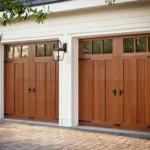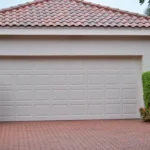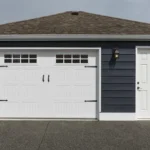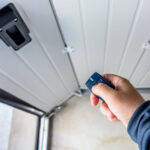You use your garage door every day, but have you ever thought about how long it will last? If you take good care of it, your garage door and opener can last much longer, saving you a lot of money on repairs or replacements.
Let’s explore some simple ways to extend your garage door lifespan.
How Long Do Garage Doors Normally Last?
Garage doors are made to handle daily use, but how long they last depends on the material they’re made from and how well you take care of them. Wooden doors usually last about 15 to 20 years if you look after them properly. Steel doors can last even longer, with an average lifespan often around 20 to 30 years.

The weather also matters a lot. If you live in an area with harsh winters or frequent storms, your door may wear out more quickly. This is especially true for the residents of Massachusetts, as the climate is varied. Additionally, frequent use of the door every day can cause premature wear. Therefore, try to use it only when absolutely necessary.
Another important thing is how the door was installed. If professionals from Garage Door Experts of Acton installed it correctly, the door will work better and last longer. These same professionals can assist with regular check-ups on your garage door, which can help you catch problems early on. It’s all about taking care of it the right way. Here are some longevity tips to help you do that!
5 Easy Ways to Make Your Garage Door Last Longer
Here are 5 simple tips to make sure your garage door stays in good shape without too much work:
- Regular maintenance;
- Lubricating moving parts;
- Checking alignment;
- Cleaning it;
- Replacing weatherstripping.
1. Regular Maintenance
The most important thing you can do is check your door every six months. Schedule regular inspections and look for any small problems before they develop into major potential issues. A little bit of attention can save you a lot of trouble later.
2. Lubrication
Use a silicone-based lubricant to oil parts like the rollers and hinges. This helps everything move smoothly and stops parts from wearing out too quickly.
3. Alignment Checks
Make sure the door is opening and closing straight. If the door looks crooked or struggles to move, it could break faster. Fix it yourself if you can, or call a professional garage technician if you’re not sure how.
4. Cleaning
Keep the tracks and door panels clean. Removing dirt and debris with a damp cloth helps the door operate more smoothly and prevents damage.

5. Replacing Weatherstripping
If the rubber seals around your door are cracked or missing, replace them quickly. Good seals keep water out and help keep your garage warm or cool, depending on the season. They also protect metal doors from rusting and wooden ones from rotting.
5 Ways to Make Your Garage Door Opener Last Longer
Taking care of your garage door is important, but don’t forget about the garage door opener, too! Here’s how you can help it last longer:
- Lubricating moving parts;
- Cleaning the sensors;
- Testing safety features;
- Using it less when possible;
- Checking wires and connections.
1. Lubricate Moving Parts
Just like the door, your opener’s moving parts need oil too. Spray a silicone-based lubricant to make sure everything runs smoothly.
2. Clean the Sensors
The sensors are responsible for preventing accidents. They can detect objects in their way and reverse the doors if necessary. If they’re dirty or not aligned correctly, the door won’t work properly. Wipe the sensors regularly and ensure they are aligned directly with each other.
3. Test Safety Features
Garage door openers have safety systems that stop the door if something is in the way. Check these safety features regularly to ensure they are still functioning properly and keeping everyone safe.
4. Avoid Overusing It
Suppose you open and close the garage door many times every day. It puts extra wear on the opener. If possible, try to limit your use of it, or consider getting an opener designed for heavy use.
5. Check the Wiring
Look at the wires and connections now and then. If you notice any signs of damage on wires or loose parts, repair them immediately to prevent more significant issues.

When Should You Replace Your Garage Door?
Sometimes, fixing an old garage door over and over again isn’t worth it. Here’s how to know if it’s time to get a new one:
- Too many repairs: If you keep having problems, it might be cheaper and easier to get a new door.
- Visible damage: Rust, dents, warping, or other signs of wear mean it could be time for a replacement.
- Old design: Even if it still works, an outdated door might not look good anymore and can lower your home’s curb appeal.
You should also think about how old the door is. If it’s 15 to 30 years old, it might be near the end of its life, especially if it needs lots of costly repairs.

Additionally, older garage doors may not have the same safety features as newer ones. A newer model could make your home safer and more user-friendly. Energy efficiency is another thing to consider. Older doors might let hot or cold air escape, making your energy bills higher. Meanwhile, newer doors are better insulated and could save you money.
If your repair bills are starting to cost more than a brand-new door, or if you just want a better-looking or safer door, it’s probably time to replace it. Call our professional team to learn more and get a free consultation!










Leave A Comment